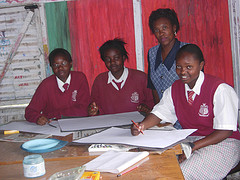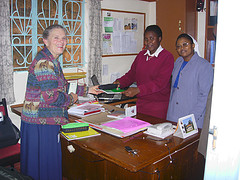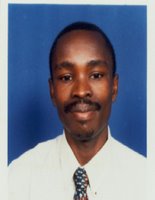President Kibaki pointed out that the Government has taken steps to implement both short and long term measures that will ensure the country does not continue experiencing maize shortage.
"We are importing more maize so as to ensure Kenyans can easily access the commodity. We are committed to ensuring that wananchi have enough food," President Kibaki said.
The President was addressing wananchi when he distributed relief maize at Kithimani Market in Yatta District, Ngoliba Market, Kilimambogo Market and Gatuanyaga Primary School in Thika East District and at Kiandutu in Thika West District. This was in February 2009 to date these areas have experienced enough shortage of food commodities.
The President said the Government is focusing on implementing water projects in the arid parts of the country including Yatta, Thika East and Thika West districts so as to provide sufficient water for domestic use and for irrigation. Though the projects are well intended to improve the areas it always takes much time for implementation to take place in such areas or even forgotten.
"The provision of water for irrigation is a long term measure geared towards addressing food shortage," the Head of State said.
President Kibaki said the Government is also working towards providing fertilizer and other farm inputs to farmers as a way of boosting food production in the country.
On youth empowerment, the President said his Government is implementing policies to create employment for the country's youth.
Emphasizing the importance of education in empowering the youth, President Kibaki once again urged parents to ensure their children acquire adequate education.
The Head of State said plans are also underway to rehabilitated roads in Yatta, Thika East and Thika West district as it is doing in other parts of the country so as to reduce the burden of transport costs on wananchi.
He commended residents of the three districts for living together peacefully and urged them to continue in the same spirit.
Speaking during the occasion, Deputy Prime Minister and Minister for Finance Uhuru Kenyatta assured Kenyans that as leaders they will rally behind the President in ensuring that Kenyans have enough food.
The Deputy Prime Minister called on leaders in the country to shelf personal interests and work together for the common good of the country. But still there is little done on these matters.
Since then the people have never seen again the rationing of food the chilling question is how can we teach our kenyans on food security issues instead of asking for assistance from our donor brothers.
Kenya should be challenged to seek help from God to show us the way forward for anything instead of all the time relying on our government for food rationing which will never be enough though we should be mind concious on what we have as a community and come up with ways on which we can sustain our communities come rain or sunshine.


